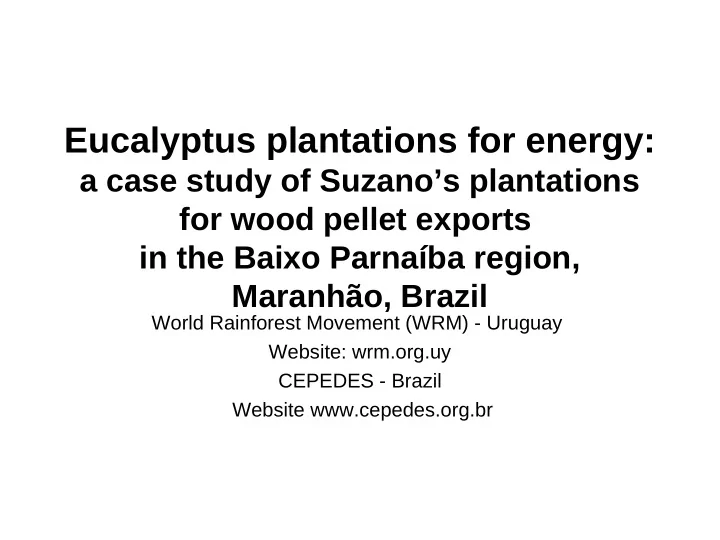

Eucalyptus plantations for energy: a case study of Suzano’s plantations for wood pellet exports in the Baixo Parnaíba region, Maranhão, Brazil World Rainforest Movement (WRM) - Uruguay Website: wrm.org.uy CEPEDES - Brazil Website www.cepedes.org.br
Industrial Tree Plantations in Brazil - Promoted since the 1960ies, during military dictatorship - Monocultures, mainly eucalyptus, mainly for pulp and paper, and charcoal for pig iron; export-oriented; - State promoted and subsidized (fiscal incentives/BNDES) - Brazil ´number one’ in productivity (44 m3 of wood/ha/year) - Nowadays about 8 million há of industrial tree plantations - Huge social (land) and environmental conflicts – no people, no biodiversity inside such plantations - Suzano one of the main companies in Brazil – traditional family company from São Paulo state – pulp and paper producer – plantations in several states, including in Maranhão
Difference ´normal´plantation from biomass plantation - Pulp/paper (eucalyptus) plantation: =>1,600 trees per hectare =>Production cycle of 6-7 years - Biomass (eucalyptus) plantation ⇒ Up to 8,000 trees per hectare ⇒ Production cycle of 1,5-2 years ⇒ With GM Trees: 20-30% more production
Mr. José Inácio Sodré Rodrigues - Superintendent of INCRA (National Institute for Colonization and Agrarian Reform) in the State of Maranhão Mr. Luiz Alfredo Fonseca - President of ITERMA (Colonization and Land Institute of the State of Maranhão) Dear Sirs, The purpose of this letter is to call your attention to the difficult situation faced by traditional communities, including quilombola communities, in the region of Baixo Parnaíba. These communities have been struggling for years for the recognition and land tenure regularization of the territories that they have traditionally occupied and used in a way that conserves the Cerrado biome, which plays a fundamental role both for them and for the local economy. We request that you undertake the necessary procedures, in accordance with the area of competence of each institution, for the regularization of land tenure for the communities located in Polo Coceira, Santa Quitéria, Bracinho, Urbano Santos and Enxu, in São Bernardo; and for the inspection and expropriation of the territories of Santa Rosa dos Garretos, Boa Uniao, São Raimundo, Bom Princípio, Urbano Santos and Mangueira, in Chapadinha, and Vertentes, Santa Quitéria, Alto Bonito and São Benedito, in São Bernardo, as well as the titling of the lands of the quilombola community of Bom Sucesso, in Mata Roma. In recent years, the communities of the Baixo Parnaíba have suffered from the pressure exerted by large landholders seeking to transform these areas of Cerrado vegetation-covered plateaus into soy plantations. These communities have also been impacted by the actions of the Suzano Papel e Celulose corporation, which is attempting to appropriate their territories to establish industrial eucalyptus plantations for the production of wood pulp for export and the planned production of wood pellets for export, to generate so-called “renewable” energy in Europe. During these years, as little progress has been made in the land tenure regularization of their territories, these communities have been forced to use their own bodies to defend these territories and the Cerrado from the destruction caused by the Suzano corporation’s machinery. It is unacceptable that communities that have lived in the region for generations in harmony and balance with the Cerrado ecosystem are suffering from this type of pressure from companies like Suzano, whose only interest is to use the land for the generation of profits. This is why it is absolutely urgent that you take concrete action to respond to the needs of these communities. The best course of action, of course, would be the regularization of land title to all of the territories cited in this letter, as this would guarantee the future, safety and well-being of these traditional/quilombola communities. Sincerely,
THANK YOU! OBRIGADO!
Recommend
More recommend